Following the final debate, Donald Trump heads to the battleground state of Ohio. President Obama, Vice President Joe Biden and First Lady Michelle Obama all campaign for Hillary Clinton.
- Donald Trump said he may not accept the election results. Hillary Clinton called this “horrifying.” On Thursday, Trump said he would accept the results -- if he wins.
- Clinton won the debate, but Trump did improve; here’s the scoring.
- Take at look at the debate transcript and nastiest exchanges, annotated by Times journalists.
- What we learned from the final presidential debate.
- Miss the debate? Here’s the full video.
- Share via
Trump gets booed by crowd at New York charity dinner
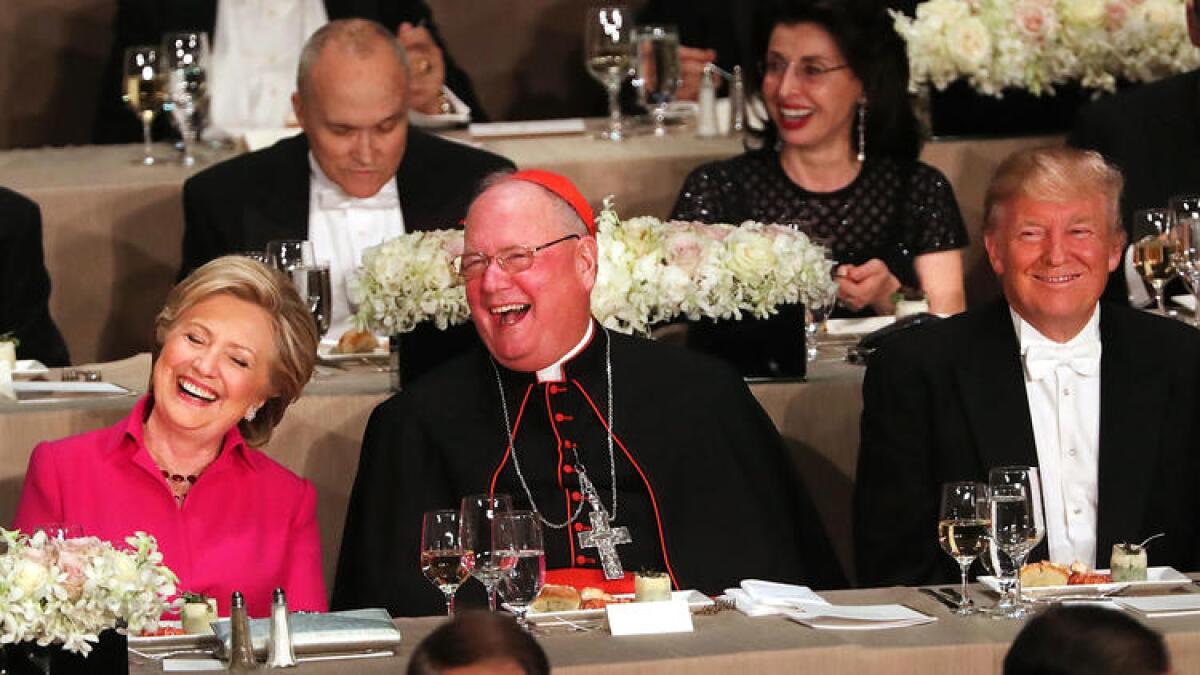
The day after the final presidential debate, where each charged the other with being a crook, a liar and a puppet, Donald Trump and Hillary Clinton honored a tradition that had them sitting down to dinner together to exchange jokes.
It was an awkward night.
The customary self-deprecating addresses candidates have been giving at the Alfred E. Smith dinner for decades had a much sharper edge this year. At times, the crowd was outright booing and hissing at Trump as the Republican presidential nominee delivered lines that sounded more like angry campaign rants than humor, even as he sought to deliver them with a smile.
- Share via
A lead Bush vs. Gore attorney disputes Trump’s claims of a ‘rigged election’
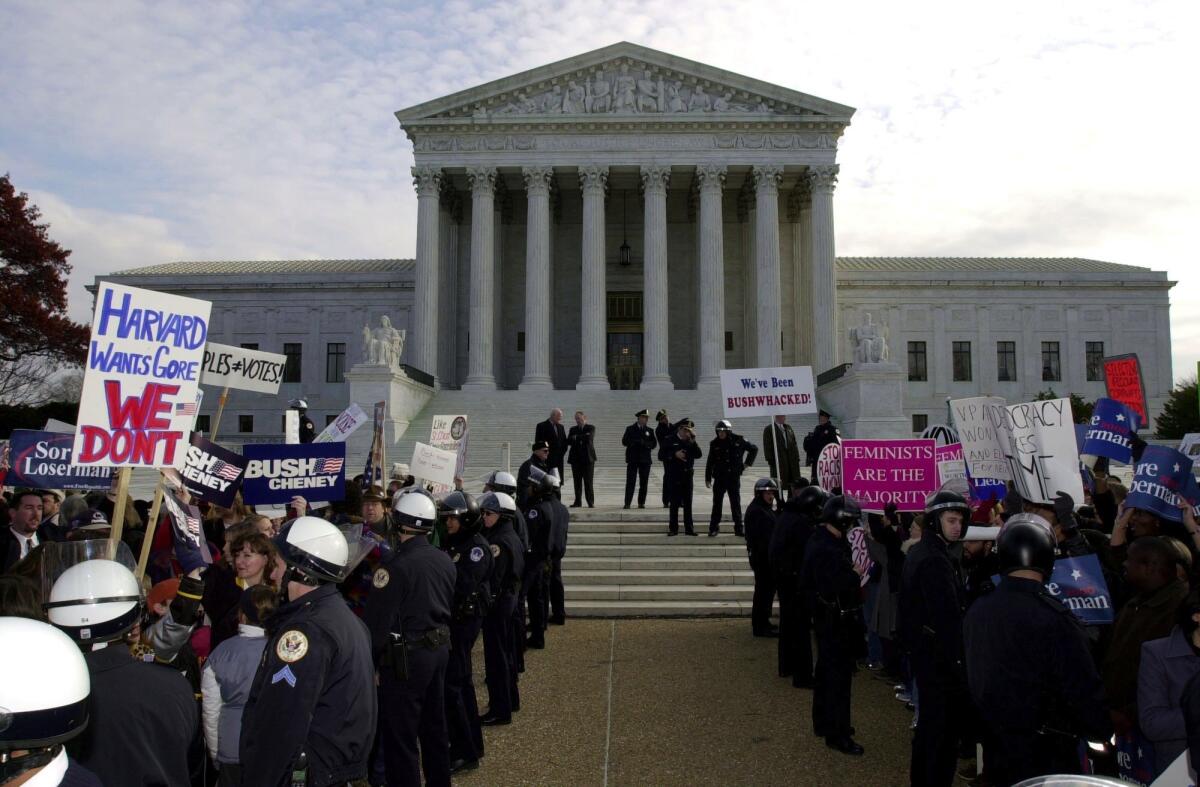
A lead attorney in the 2000 Bush vs. Gore recount disputed GOP presidential nominee Donald Trump’s claim of a “rigged election” on Thursday.
David Boies, who argued then-Vice President Al Gore’s case before the Supreme Court, rejected Trump’s comparisons between the 2016 election and the contested vote that put George W. Bush in the White House 16 years ago.
“In 2000, both George Bush and Al Gore said that they would respect and abide by whatever the ultimate [result] was,” Boies said in a phone interview. “But there was never a suggestion by either side that they would impugn the legitimacy of the result, that they would claim it was a rigged decision, that they would claim it was flawed.”
During Wednesday night’s debate with Democratic nominee Hillary Clinton, Trump twice refused to commit to accepting the election’s outcome.
“I will look at it at the time,” Trump said. “I’ll keep you in suspense.”
On Thursday, he said he would accept the election’s results -- if he wins.
Trump faced immediate backlash from members of both parties. But his supporters hit back, pointing to the recount in the 2000 contest between George W. Bush and Al Gore.
That year, the television networks called Florida for Bush, ostensibly giving him the electoral votes to win the White House. Gore called Bush to concede, but then the networks realized Florida was too close to call and rescinded their decision that Bush had won the Sunshine State.
Gore took back his concession, and a recount began in Florida, as mandated by state law in the case of such a close vote. Gore sought hand recounts in a handful of counties; Bush sued to stop them. A legal battle ensued. Ultimately, Bush took the matter to the Supreme Court, which stopped the recount. Gore said he disagreed with the decision but conceded the race.
Theodore Olson, who represented Bush in the legal battle, was unavailable for comment.
But several Republicans who were around Bush at the time of the recount also disputed Trump’s comparisons between this year’s election and what happened in 2000. And Boies said he was confident that had the results gone in Gore’s favor, Bush would have conceded.
“It was a very close election,” Boies said. “The counting of the votes was obviously a contested matter, but once the votes had been counted, and once the Supreme Court had decided that there would be no further counting of the votes, Al Gore immediately conceded and accepted the result.… I believe that if the result had been different, George W. Bush would have done the same thing.”
He decried the allegations of rampant voter fraud being spread by Trump surrogates such as Rudolph W. Giuliani, saying the former New York mayor “knows better than that.”
“When somebody of Rudy’s stature begins to talk about the danger of significant voter fraud, I think that’s highly undesirable,” Boies said. “To have these kinds of statements coming from somebody who is well known and a person of substance … can cause people to have a loss of faith in our democratic process.”
However, Boies said he was confident that Trump would concede the election to Clinton if he lost. He said he would step in to defend the Democratic nominee if there was a protracted legal battle, though he found that prospect unlikely.
“My personal view is this is not going to be that close,” Boies said. But “I would be involved if there is a contest.”
- Share via
Trump ends TV interview after reporter notes he has been labeled racist and sexist
Donald Trump ended an interview Thursday with an Ohio television reporter after she noted that he had been labeled a racist and a sexist.
“Thank you very much,” the GOP presidential nominee said to Colleen Marshall, a reporter for the NBC affiliate in Columbus, as he walked away. He paused and said, “I am the least racist person you’ve ever met,” before leaving.
Trump, who campaigned in Delaware, Ohio, on Thursday, has repeatedly come under fire during the campaign for comments he has made about Latinos, African Americans, Muslims and women, as well as other groups.
Marshall’s question came at the tail end of a nearly four-minute interview in which Trump discussed his belief that large amounts of voter fraud were taking place, and spoke broadly of cutting taxes.
- Share via
Trump faces bipartisan criticism, from the White House down, for saying he may ignore election result
Donald Trump faced a bipartisan chorus of criticism Thursday for suggesting he might ignore the results of the election if he loses, with President Obama denouncing the statement as an attack on the country’s democracy.
“When last night at the debate Trump becomes the first major party nominee in American history to suggest that he will not concede despite losing the vote and then says today that he will accept the results if he wins, that is not a joking matter,” Obama said at a boisterous rally for Hillary Clinton in Miami.
“That is dangerous because when you try to sow the seeds of doubt in people’s minds about the legitimacy of our elections, that undermines our democracy,” Obama went on. “Our democracy depends on people knowing that their vote matters. That those who occupy the seats of power were chosen by the people.”
The president was just the most prominent voice among Democrats denouncing the GOP nominee.
- Share via
Michelle Obama: Trump ‘is threatening the very idea of America itself’
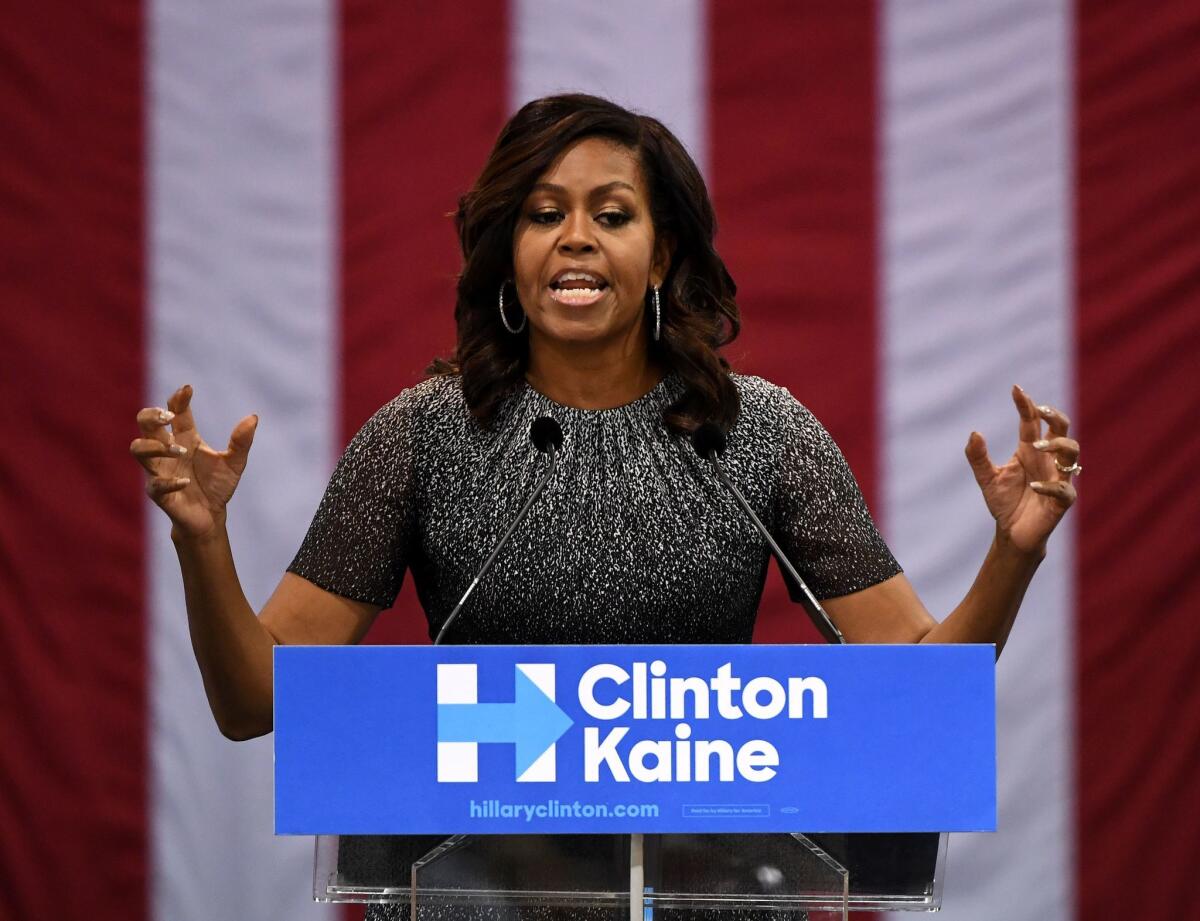
First Lady Michelle Obama said on Thursday that Donald Trump is threatening the foundation of American government by refusing to commit to accepting the elections results.
“Our democracy is revered around the world, and free elections are the best way on earth to choose our leaders,” she told supporters at a rally for Hillary Clinton in Phoenix.
“We are fortunate to live in a country where the voters decide our elections, the voters decide who wins, who loses, period, end of story. When a presidential candidate threatens to ignore our voices and reject the outcome of the election, he is threatening the very idea of America itself, and we cannot stand for that,” she said.
Obama joined several other prominent Democrats and Republicans who have expressed alarm over Trump’s refusal during Wednesday night’s debate to commit to accepting the election’s outcome. “I will look at it at the time,” Trump said, adding later, “I’ll keep you in suspense.”
The first lady, who by practice does not utter Trump’s name in her speeches, expressed contempt for his words.
“You do not keep American democracy in suspense,” she said, “because, look, too many people have marched and protested and fought and died for this democracy.”
The campaign speech was Obama’s first since she delivered an emotional and raw address a week ago condemning Trump’s alleged sexual misconduct.
She said she was “so humbled” by the response, a torrent of letters from women sharing their stories, parents demanding better for their children and men saying such behavior is unacceptable.
“This kind of courage and decency and compassion, this is who we are,” Obama said. “This is the America that I know.”
Obama was campaigning in Arizona, a state that has gone Republican every time but once since in 1948. But Democrats are increasingly confident the state is in play this year.
Obama is the third Clinton surrogate to campaign there this week, after Bernie Sanders and Chelsea Clinton. Clinton’s campaign has boosted its television advertising in the state and is expanding its direct mail and digital efforts by more than $2 million, the campaign announced this week.
Obama noted that four years ago, her husband lost the state by 208,000 votes, or about 63 votes per precinct.
“This year, we know it’s much closer here in this state,” she said. “That’s why I’m here.”
- Share via
Gloria Allred’s latest foray into political controversy: representing two Trump accusers
Donald Trump’s campaign responded to the latest groping accusation on Thursday by attacking the attorney who brought the accuser and a prior one into the public eye.
“Discredited political operative Gloria Allred, in another coordinated, publicity-seeking attack with the Clinton campaign, will stop at nothing to smear Mr. Trump,” said Trump spokeswoman Jessica Ditto. “Give me a break. Voters are tired of these circus-like antics and reject these fictional stories and the clear efforts to benefit Hillary Clinton.”
Allred is a Democrat and a longtime Clinton backer who served as a delegate for her at the Democratic National Convention. She’s also a Los Angeles-based attorney known for her theatrical ways who has gone after powerful politicians in both parties.
Admired by her supporters as a staunch defender of women’s rights and decried by her critics as a publicity-seeking ambulance chaser, Allred has been involved in many of the nation’s notable political scandals in recent years. Here’s a list of some of the elected officials and candidates Allred has tangled with:
Herman Cain, 2012 GOP presidential candidate
Allegations of sexual harassment and adultery swirled around Cain, the former pizza chain chief, in the fall of 2011. In November of that year, Allred introduced the world to Sharon Bialek, the first woman to publicly accuse Cain of sexually harassing her. He dropped out less than a month later.
Anthony Weiner, former Democratic member of Congress
The New York Democrat, who is separated from his wife, a top Clinton aide, was repeatedly caught sending sexually explicit texts and pictures to other women.
During his first sexting scandal, when Weiner was in Congress, several women said he sent them inappropriate messages after he inadvertently tweeted a picture of his crotch. One was former porn star Ginger Lee, who was represented by Allred. The attorney read from Weiner’s messages at a 2011 news conference, and Lee said the congressman had asked her to lie about their relationship. Shortly afterward, he announced he would resign from Congress.
Bob Filner, former Democratic mayor of San Diego
In July 2013, as anonymous accusations of sexual harassment by Filner grew, Allred announced she was suing the city on behalf of Irene McCormack Jackson, the mayor’s former communications director. McCormack Jackson was the first of 19 women to publicly accuse Filner of sexual misconduct.
He resigned a month later and pleaded guilty to one felony count of false imprisonment and two misdemeanor battery charges. The city and McCormack Jackson settled for $250,000.
Meg Whitman, 2010 Republican candidate for governor of California
Just over a month before the 2010 election, Allred introduced Californians to Nikki Diaz, an immigrant living in the country illegally who worked as a housekeeper for Whitman. She was fired shortly before Whitman launched her political bid.
Whitman probably was already headed toward defeat, but the image of the sobbing housekeeper saying Whitman treated her like “garbage” after she cared for her family for years was one more strike against her.
Whitman, currently Hewlett-Packard’s chief executive, is now a supporter of and fundraiser for Clinton.
- Share via
Chris Wallace says he’s learned ‘not to be surprised’ by Trump

Asked if he will accept the results on election day, Donald Trump tells the country he wants to “leave you in suspense.”
Chris Wallace told the Los Angeles Times today that he wasn’t shocked by Trump’s answer to the question about whether he’d accept the election results.
“I have been covering Trump for a year and half,” Wallace said. “I’ve learned to not be surprised by anything.”
The veteran Washington journalist and first-time presidential debate moderator knew that the magnitude of the response required him to frame the question a second time.
“I thought, ‘You need to put this in historical context,’ which is why I asked a follow-up question about one of the long traditions of democracy — the idea of the peaceful transfer of power and that we accept the results of the election,” said Wallace. “I wanted to put it in context so that it was clear that whatever Trump said, folks understood how unprecedented this would be.”
- Share via
‘Trump didn’t come out of nowhere,’ Obama says
President Obama mocked Republicans Donald Trump and Sen. Marco Rubio mercilessly for an hour here Thursday, lashing the two political enemies together in a spirited pitch for their Democratic opponents before an audience of key swing-state voters.
Obama recalled how Rubio said when he sought the GOP nomination for president that the country couldn’t afford to give the nuclear codes to an erratic individual like Trump.
Rubio also called Trump a dangerous con artist who has spent a career sticking it to working people, Obama noted.
“That begs the question. Why is Marco Rubio supporting Donald Trump?” Obama said. “There has to be a point where you stand for more than just your own career.”
The diatribe against Rubio was more gleeful than last week’s takedown of Republican Sen. Rob Portman in his home state of Ohio, and far more personal in connecting the Florida Republican with his party’s presidential nominee.
As Rubio’s Democratic opponent, Rep. Patrick Murphy, stood in the back of the gymnasium laughing and clapping, Obama joked that GOP officials like Rubio are getting what they created, as Trump threatens to drag down other members of his party on the ballot.
“Trump didn’t come out of nowhere,” Obama said. For years, Republican politicians and far-right media outlets have been “pumping out all kinds of toxic crazy stuff,” he said, leading off the list with the long-running falsehood that Obama was not born in the U.S.
“And there are a lot of politicians like Marco Rubio who know better,” Obama said. “They just looked the other way [thinking], ‘If we just stir things up … that’s going to help us get votes.’
“So they just stood by and said nothing,” he said, “while their base actually started believing this stuff.”
The critique was especially stinging given the enmity between Rubio and Trump. During the primary, Rubio repeatedly called out Trump for seeking the presidency based on a self-interested business career. Trump responded by belittling the junior senator from Florida. “Little Marco,” he called him.
Now Rubio is tied to a candidate who is suggesting that he will only accept the outcome of the election if he is the winner, Obama said in a rally at Florida Memorial University.
Rubio has criticized Trump for those statements, but Obama said his critiques are too little, too late.
“It is the height of cynicism,” Obama said, to “pretend to be anybody just to be elected.”
- Share via
We’ve updated our electoral map: More states move away from Trump
Now that the presidential debates have finished, we’ve updated our electoral map once again. Like our last update, this one shifted more states away from Donald Trump.
The biggest shift: Florida, the nation’s largest swing state, is now light blue, as we’ve moved it from the battleground category to a Democratic lean.
In all, our map shows Clinton ahead in states with 308 electoral votes -- 38 more than the 270 needed to win the presidency. Trump has 174. Five states, with 56 electoral votes, are toss-ups.
We had kept Florida as a toss-up in our previous update of the map because of its history as the scene of some of the country’s closest electoral battles.
As Democratic strategist Steve Schale likes to note about his state, in the past four elections, about 30.5 million presidential votes have been cast in Florida, and the difference between Republicans and Democrats comes to 71,000 votes -- just 0.24% of the total. No other state has been closer.
But this year, Clinton seems to be on track to break that pattern. She has led in nine of the last 10 public polls, and her lead appears to be growing. On average, she’s now ahead by about four points in polling averages of the state.
The other two shifts come in the West. As we’ve previously noted, Mormon antipathy to Trump has contributed to making Arizona a battleground state. It’s also why we’re now adding Utah to that list.
Clinton isn’t likely to win Utah -- no Democrat has in a presidential race since 1964. But polls indicate that Evan McMullin, a former congressional staff member and CIA operative who is a graduate of Brigham Young University, could win there. If so, he’d be the first third-party candidate to win a state since George Wallace in 1968.
Finally, Trump’s weakness among Republicans has also caused polls to tighten in Texas. We still think the Republican will win there, but we’ve moved the state from solid red to pink, reflecting the reality that even that state is not definite for Trump.
- Share via
After all three debates, our analysts say Clinton emerged victorious
- Share via
Bill Clinton derides Trump’s view of election results
Former President Bill Clinton mocked Donald Trump’s refusal to commit to accepting the election results unless he won.
“We’d all like that if life were like that, wouldn’t we? If we won every moment of every day,” Clinton said Thursday while campaigning for Democrats in Nevada.
“The truth is, we don’t win every moment of every day, and what we want to do is have a free and open country where there’s equal opportunity for people to get a handout if they fall down and where we can all win together.”
During the third and final presidential debate Wednesday, Trump twice refused to commit to accepting the election results. While campaigning in Ohio on Thursday, Trump said he would accept the results, if he won.
Clinton also noted that he was a white male Southerner as he weighed in on Trump’s campaign slogan, “Make America great again.”
“Fifty years ago wasn’t so great for African Americans,” Clinton said.
- Share via
Biden calls Trump’s refusal to commit to accepting election results ‘a threat to our democratic process’
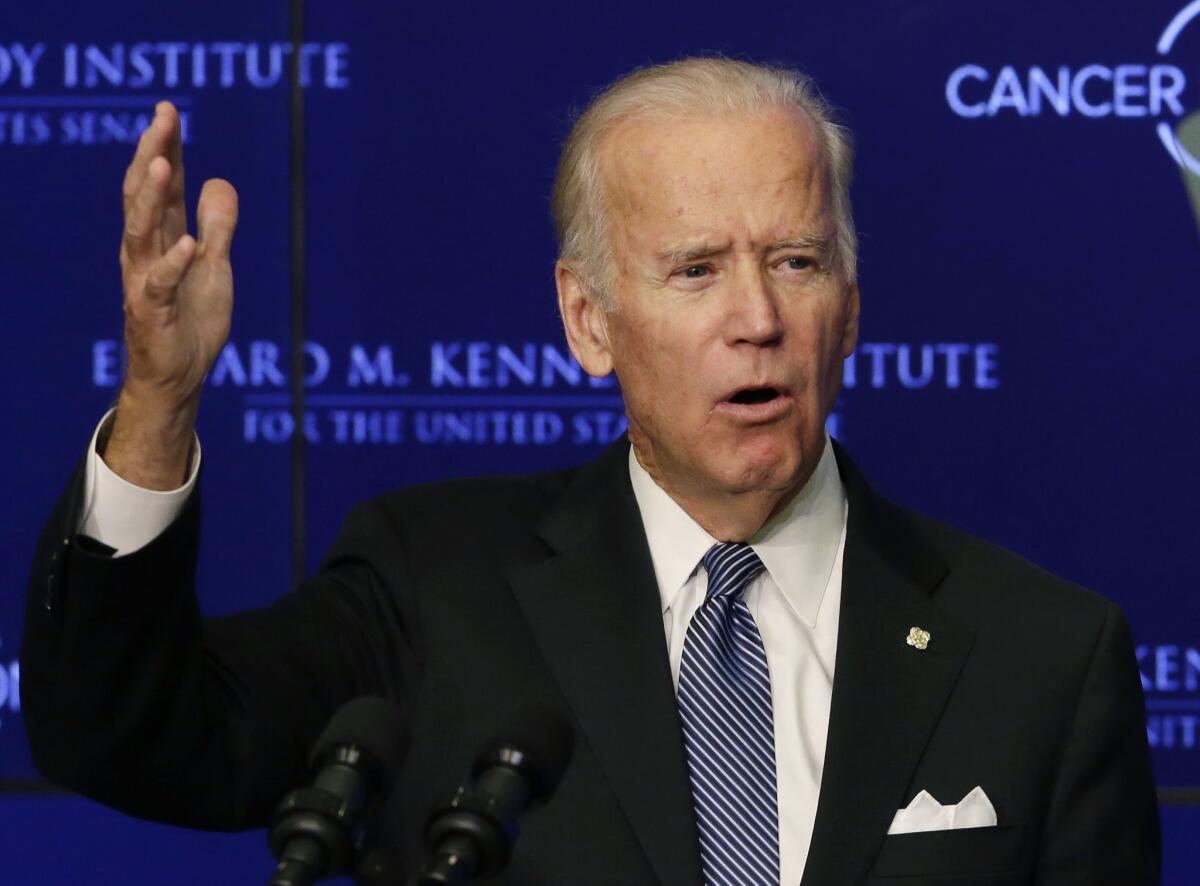
Vice President Joe Biden said Thursday he was alarmed by Donald Trump’s refusal to commit to accepting the election results.
“That is a big problem,” Biden said during a visit to a Democratic field office in Manchester, N.H. “The American public has to stand up, even Republicans. ... This is a threat to our democratic process, and the way to reaffirm it is to have an exceptional turnout.”
During Wednesday’s third and final presidential debate, Trump twice declined when pressed to say whether he would accept the outcome of the election.
“I will look at it at the time,” Trump said. “I’ll keep you in suspense.”
Biden also said he was stunned by the GOP nominee’s claim Wednesday night that an Iraqi-led coalition, which includes U.S. soldiers in advisory roles, decided to try to retake the city of Mosul from the Islamic State terrorist group to help Hillary Clinton win the White House.
“Think how absurdly bizarre that is?” Biden asked.
Biden was visiting Manchester to stump for New Hampshire Gov. Maggie Hassan’s effort to unseat Sen. Kelly Ayotte. Later Thursday afternoon, he was to campaign for Clinton in Nashua, N.H.
- Share via
Donald Trump says he’ll accept the results of the election — but only if he wins
Donald Trump made light Thursday of his refusal to promise that he would accept the results of the election.
“I want to make a major announcement today,” he said during his first rally since Wednesday’s debate, held at a large barn in Delaware, Ohio. “I would like to promise and pledge to all of my voters and supporters and to all of the people of the United States that I will totally accept the results of this great and historic presidential election — if I win.”
As is often the case with Trump, his attempt to recast an assertion that caused him political trouble was laced with grievances and qualifiers, and in this case, more unsubstantiated accusations that the election would be improper.
Trump’s debate performance Wednesday drew bipartisan rebukes after he twice refused to promise that he would concede a clear victory if his opponent, Hillary Clinton, wins the election.
“I will keep you in suspense,” Trump said during the debate.
The notion that he would refuse to concede a clear result defies American democratic tradition, which depends on a peaceful transition of power. Trump insisted Thursday that he was merely preserving his right to contest a close election, comparing his stance to that of Al Gore and George W. Bush during the 2000 recount.
“Of course, I would accept a clear election result,” he said. “But I would also reserve my right to contest or file a legal challenge in the case of a questionable result. And always I would abide by all of the rules and traditions of all of the many candidates that have come before me.”
But neither nominee in 2000 left doubt that they would concede the race once all legal options and requests for recounts were exhausted, different from Trump’s insistence that a loss by him could only be the result of widespread fraud.
Indeed, Trump repeated unfounded allegations that the election would be fraudulent. Elections experts say there is no evidence of widespread fraud in prior presidential elections, which are decentralized across thousands of localities.
At the rally, Trump also accused Clinton of accessing debate questions beforehand. Donna Brazile, a former CNN contributor who now heads the Democratic National Committee, suggested in an email released by WikiLeaks that she could get Clinton a question before a primary debate against Bernie Sanders. After the email emerged, Brazile denied supplying Clinton a question.
“Can you imagine if I got the questions?” Trump said. “They would call for the reestablishment of the electric chair.”
He compared the accusation to Clinton receiving the questions to the scandals that rocked television quiz shows in the 1950s.
“Why shouldn’t Hillary Clinton resign from the race? She was given these questions. She used these questions, studied the questions,” he said. “Hence the name ‘Crooked Hillary.’”
- Share via
An alternative look at the USC/L.A. Times poll now shows Clinton ahead by 5 points
As we wrote yesterday, Ernie Tedeschi, an economist and former Treasury Department official, took the data from the USC/Los Angeles Times “Daybreak” poll of the election and changed what pollsters call the “weighting.”
Tedeschi’s reweighted version shows Hillary Clinton leading for most of the summer and fall. As of today, his version shows Clinton ahead by 5.3 percentage points, while the official version of the poll shows Donald Trump with a tiny lead -- of 0.6 points, basically a tie.
Tedeschi’s work highlights a crucial point about polling: The numbers that polls present almost always involve a series of decisions made by pollsters, and those decisions are always subjective. Pollsters make their best efforts to get the numbers right, but given the same data, different pollsters will often come up with different results.
Tedeschi’s version produces results that closely parallel the Real Clear Politics average of polls. He didn’t design his approach with that in mind, but it worked out that way.
That doesn’t mean it’s necessarily right. Indeed, some of the biggest polling failures in recent years appear to have been worsened by pollsters who tweaked their numbers to stay close to the average -- a practice derisively referred to as “herding.”
Which approach is the right one is unknowable until the election results are in. In the meantime, however, Tedeschi’s approach provides another, reasonable look at the data, and in the interest of transparency, we wanted to share it.
- Share via
John McCain: Conceding an election is ‘an act of respect’ to Americans
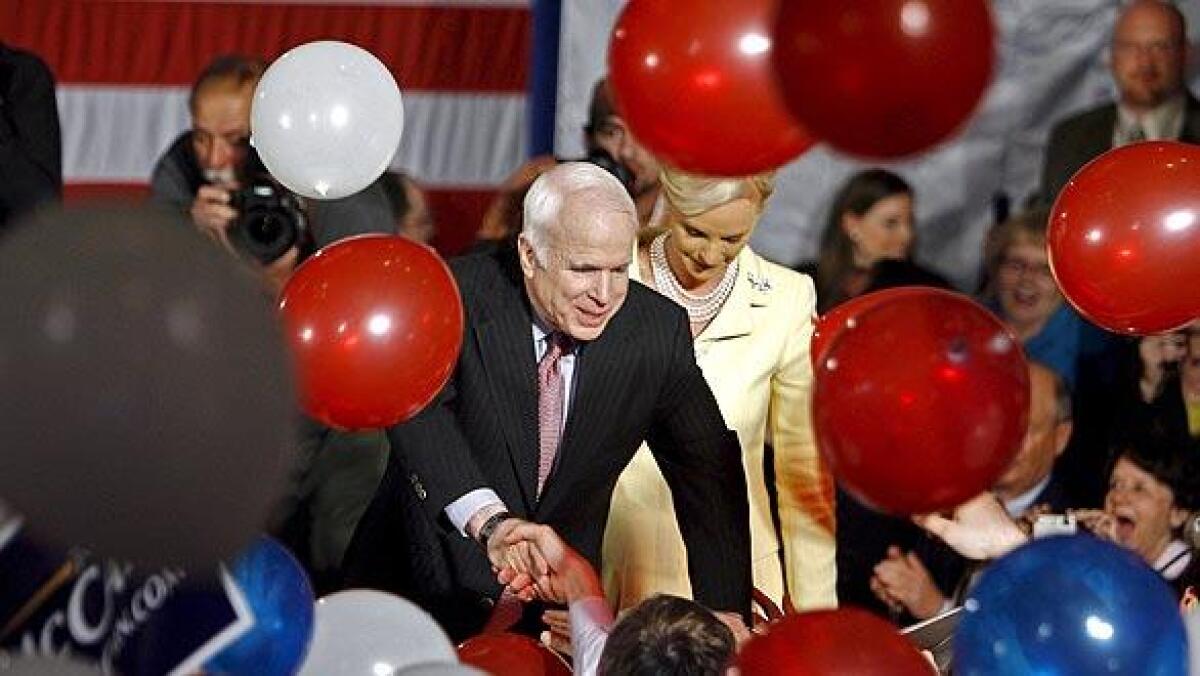
Sen. John McCain never mentioned Donald Trump by name in a statement Thursday “regarding the integrity of the U.S. election system.”
But McCain, the 2008 Republican presidential nominee, seemed to be speaking to Trump and urging a graceful concession of defeat should Trump lose the presidential race as McCain did.
“I didn’t like the outcome of the 2008 election. But I had a duty to concede, and I did so without reluctance,” McCain said. “A concession isn’t just an exercise in graciousness. It is an act of respect for the will of the American people, a respect that is every American leader’s first responsibility.”
McCain, who is seeking reelection next month, said Arizona voters should be confident in the integrity of the election.
“Free and fair elections and the peaceful transfer of power are the pride of our country, and the envy of much of the world because they are the means to protecting our most cherished values, the right to liberty and equal justice,” he said.
“America has a reputation and an example to uphold in the eyes of the world that is at the core of our ability to influence world events.”
- Share via
Another woman accuses Donald Trump of groping
Another woman has come forward accusing Donald Trump of making unwanted sexual advances, saying the decades-old encounter left her feeling shame and disgust.
Speaking at a New York news conference Thursday, Karena Virginia described leaving the U.S. Open tennis tournament in Flushing, N.Y., in 1998 and as she waited to be picked up, she noticed Donald Trump among a group of men looking at her and commenting on her appearance.
Trump then approached her, grabbed her right arm and touched her breast, she said. When she flinched, he responded: “Don’t you know who I am?” Virginia said.
“I felt intimidated and I felt powerless.”
Virginia, joined by attorney Gloria Allred, insisted she had not come forward at the behest of any rival campaign. Many advised her not to speak out, she added, for fear that Trump would attack her as he has other women who have come forward with similar stories in recent days.
“Perhaps he will label me as just another nasty woman,” she said, referring to a Trump put-down of Hillary Clinton in Wednesday’s debate.
But Virginia said she felt it her “duty as a woman, as a mother, a human being, and as an American citizen to speak out and tell the truth about what happened to me.”
She and Allred said they did not intend to file any criminal complaint.
Trump’s campaign dismissed the latest allegation as a politically motivated hit, but did not address the specifics.
“Gloria Allred, in another coordinated, publicity seeking attack with the Clinton campaign, will stop at nothing to smear Mr. Trump,” said spokeswoman Jessica Ditto. “Give me a break. Voters are tired of these circus-like antics and reject these fictional stories and the clear efforts to benefit Hillary Clinton.”
Allred is a Democrat and long-time supporter of Hillary Clinton. But she has gone after politicians in both parties over their treatment of women.
During the debate, Trump said that the recent other accusations had been debunked and insisted no one had greater respect for women than him.
11:19 a.m.: This story was updated with comments from the Trump campaign.
- Share via
A pro-Clinton super PAC is expanding its focus and looking to help swing the Senate too
Is there a wave coming? It seems Democrats think there’s a chance to build one.
On Thursday, a pro-Clinton super PAC made an interesting strategic decision: launching a new ad targeting not just Donald Trump, but a Republican senator fighting to keep her seat.
Priorities USA’s new ad airing in New Hampshire targets Sen. Kelly Ayotte for standing by Trump despite a series of controversies throughout the year.
It includes her recent answer at a debate that she would “absolutely” point to Trump as a role model, a comment she later retracted.
“But now she’s running away, trying to save her political career,” a narrator says. “Kelly Ayotte’s all politics, no principles.”
Ayotte, seeking a second term in the Senate, is locked in a tight race against the state’s Democratic governor, Maggie Hassan.
The Priorities ad is its first focusing on a Senate race, and more will come. A spokesman said the group will launch another spot targeting Sen. Pat Toomey in Pennsylvania.
The ads are something of a political twofer, repeating an anti-Trump message in a presidential battleground state that also features a competitive Senate race.
If Democratic nominee Hillary Clinton were to win the presidency, her success in office may depend on how much support she has in Congress to help enact her agenda. The ad reflects a broader calculation among Democrats that they need to ensure a President Clinton has reinforcements on Capitol Hill.
- Share via
Nancy Pelosi embraces Donald Trump’s ‘nasty’ slight
- Share via
Letter from George H.W. Bush to Bill Clinton sparks longing for civility
A 1993 letter from former President George H.W. Bush to former President Bill Clinton had social media users wishing for more civil politics Wednesday.
Bush wrote the letter after Clinton defeated him in the 1992 election, and welcomed the incoming president with “great happiness.” Following Donald Trump’s refusal during Wednesday’s presidential debate to say whether he would accept the election results, it had Twitter users longing for better times.
Bush also wrote in the letter that Clinton came in as “our president” — a stark contrast in from Trump’s declaration.
But some pointed to how former President Clinton’s staff left the West Wing with $15,000 worth of damage after his exit from the White House.
- Share via
Both campaigns try to make sense of Donald Trump’s comments about accepting election results

Asked if he will accept the results on election day, Donald Trump tells the country he wants to “leave you in suspense.”
So what did Donald Trump really say — or mean — about whether he’d accept the results of the presidential election? It was the subject of some parsing on the morning after the final presidential debate of 2016.
First, let’s go to the transcript: “I will look at it at the time. I’m not looking at anything now. I’ll look at it at the time,” he said at first.
When pressed further, he added: “What I’m saying is that I will tell you at the time. I’ll keep you in suspense. OK?”
The idea that the Republican nominee for president might not accept a clear verdict of the voters would be unprecedented. But Trump campaign manager Kellyanne Conway said Thursday that Trump was making, she thought, a different argument.
“It would be ridiculous for him to [foreclose] the possibility, and go through every hypothetical possible in the world if he’s losing by a couple of points somewhere, or a couple of votes somewhere rather, then perhaps he’ll look at it then,” she said on MSNBC’s “Morning Joe.” “That’s probably what he meant.”
Former Vice President Al Gore might have answered a similar question with a clear yes, she noted, but does that mean he was wrong to insist on full recounting of votes in Florida in 2000 given the close outcome?
“Why would he [set aside] the possibility until we know what the results are, and they’re certified and they’re verified?” she said of Trump.
Democratic vice presidential nominee Tim Kaine offered Trump the benefit of the doubt — accepting the possibility that he was not laying the groundwork for a protest regardless of the margin. But he said Trump’s comments had to be put in the context of other remarks he’s made this week.
“If all Donald Trump had said [was], ‘We’ll wait and see,’ and he hadn’t been for weeks talking about the fact that the election is rigged, challenging the ability of America to produce a sound democratic election, then it wouldn’t have been a big story,” he said on “Morning Joe.”
“But the fact that he’s been pushing this notion that if he loses, it’s gotta be because things are rigged against him, that’s why the moment was so powerful.”
Kaine noted that he lived in Honduras as a missionary 35 years ago under a military dictatorship.
“I sure learned that a central pillar of our democracy is accepting the results of a election in a peaceful transfer of power,” he said. “After running a campaign that insults virtually every group possible, now Donald Trump is trying to pull the central pillar down. And that was very revealing of a guy who just can’t take responsibility for his own failures.”
Clarity, though, remained elusive. Immediately after the debate, Trump flew to Ohio ahead of a rally there Thursday afternoon. He did not speak to reporters.
- Share via
Trump declares debate victory with a 3 a.m. tweet
- Share via
We scored the third presidential debate. Hillary Clinton won, and it wasn’t even close.

Times judges give the victory to Hillary Clinton. Again. Full campaign coverage.
Hillary Clinton and Donald Trump met in Las Vegas on Wednesday night for the third and final presidential debate. To help us determine the winner, we enlisted the help of three of our political writers and columnists to act as judges. Each judge scored every round as a win, lose or draw and declared Hillary Clinton the winner at the end.
- Share via
In final debate, Trump won’t say he’ll accept election results. Clinton’s response: ‘Horrifying’
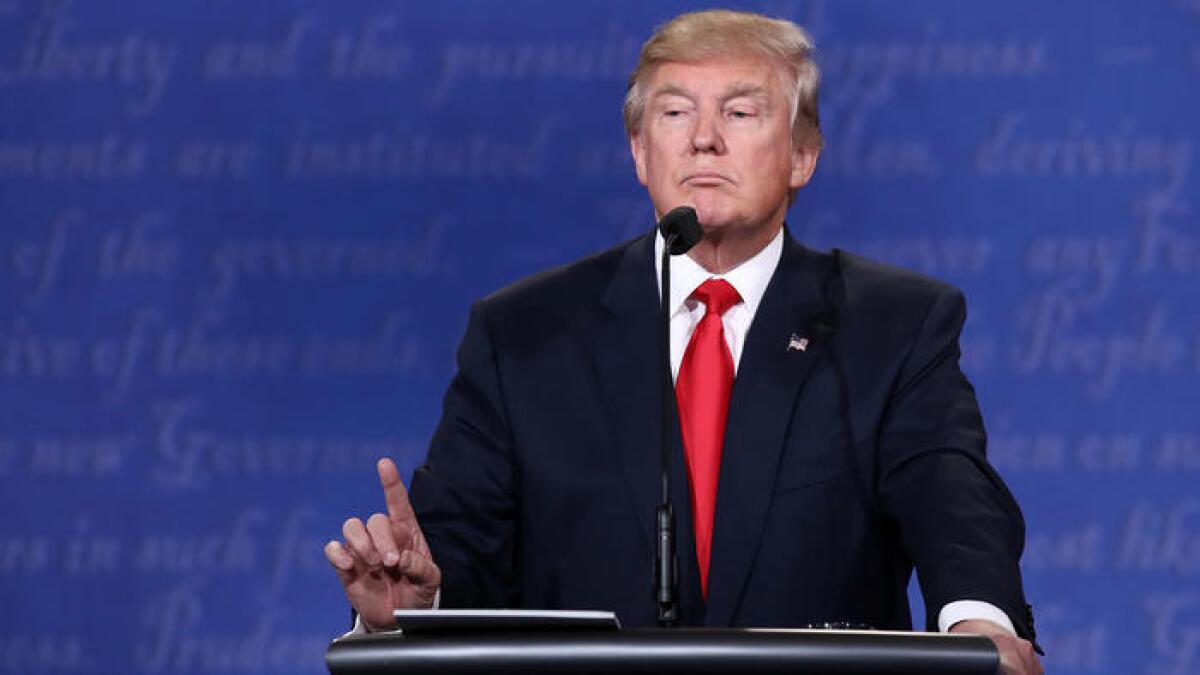
Donald Trump slashed fiercely at Hillary Clinton on Wednesday night in their third and final presidential debate, calling her “a nasty woman,” a liar and a failure, and saying he might not accept the results of the election if she wins.
Clinton parried the assault with a scathing attack on the GOP nominee as a greedy misogynist and bully, who used his public prominence to personally enrich himself, take advantage of women and exploit employees of his lucrative business empire.
She said she found “horrifying” the intimation he would not accept the will of the people on Nov. 8.
After a fairly placid start, in which they differed over guns, Supreme Court appointments and taxes in a relatively civil tone, the debate turned into an angry flood of innuendo and insult, starting when Trump defended himself against allegations he had repeatedly forced himself on women.
- Share via
A new problem for the wealthy: Living in a building named ‘Trump’

Donald Trump has long been one of this city’s top figures in real estate, affixing his name — invariably in gold — to the marquees of more than a dozen Manhattan buildings.
But as his polarizing campaign for president has turned a segment of the population against him, home has become an uncomfortable place for some. At several Trump buildings, residents are quietly petitioning to get rid of his name.
“I used to tell people I lived in Trump Place. Now I say I live at 66th and Riverside Boulevard,’’ said Sandra Brod, 74, a retiree waiting for a friend at a park bench outside her building one recent afternoon. “He has a mouth like a sewer.”
- Share via
Donald Trump undoes his third and best debate performance in just a few words
Donald Trump needed a compelling victory in Wednesday’s debate to alter the course of a campaign that has increasingly moved toward Hillary Clinton both nationally and in key states.
He did not get it.
The final debate was notable for delving into policy matters more than in two prior meetings, and for a more measured performance by Trump, in what was undeniably his best debate.
But whatever good he might have done for himself was flattened in two moments in which he appeared unable to take responsibility for his actions and unwilling to put aside personal disappointment for the nation’s good.